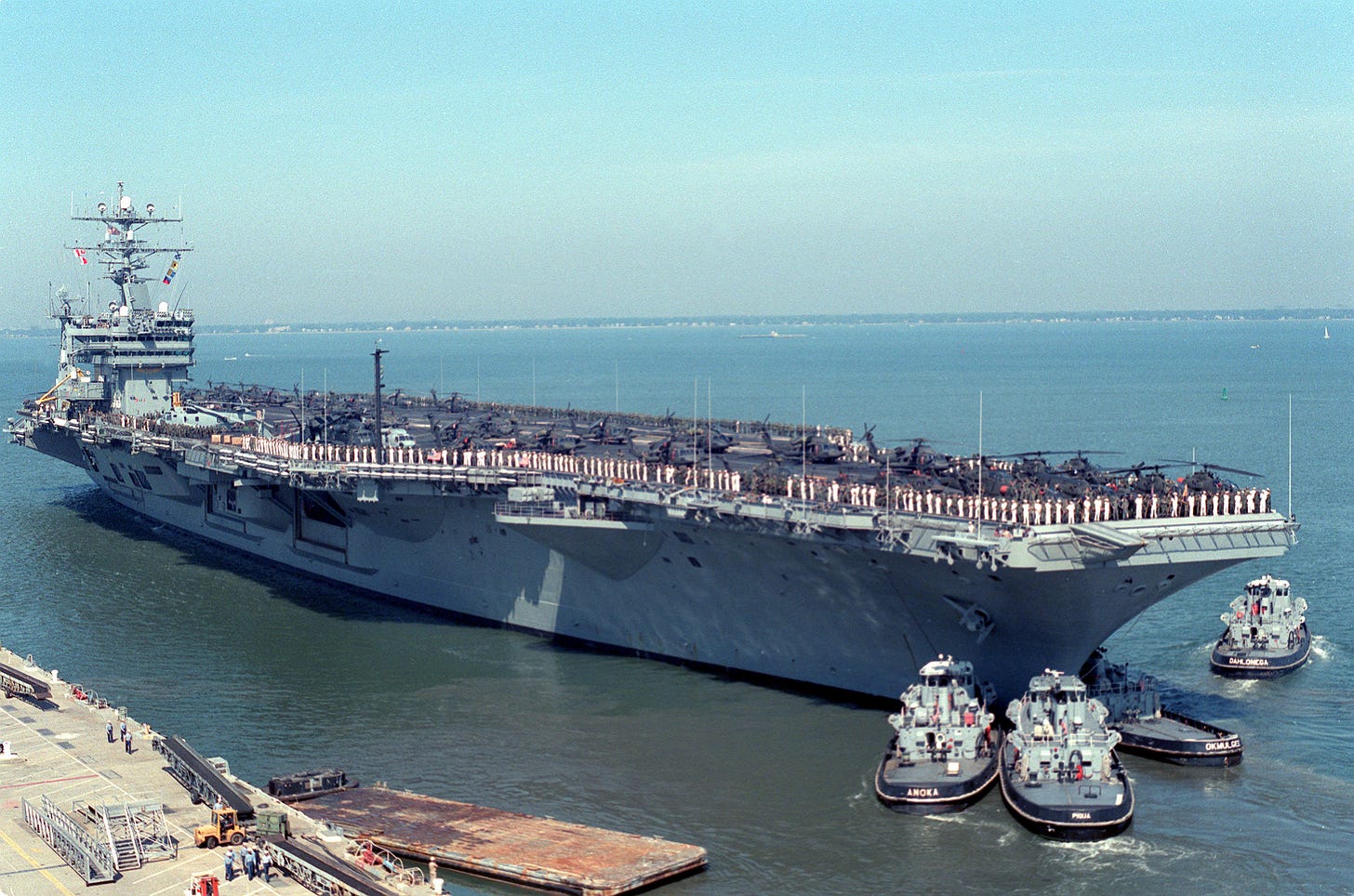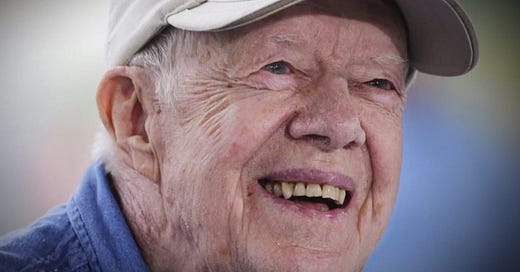Jimmy Carter and Me
I never met the man, but our lives did intersect, and I'm better off for it
by Tom McMahan
As a Democratic Party Chair…a Georgia Democratic Party Chair at that…you might expect this to be more of a hagiography than biography, a rose-colored remembrance of Mr Jimmy.
It isn’t. I’m writing this wearing two hats: the first as historian, the second one as just me.
On the historian front, I’ve created a short bibliography of books (listed at bottom) by actual historians or serious journalist/historians on President Carter. In them, you see that President Carter showed both the promise and the limitation of being a “maverick” politician. Sometimes, his combination of intelligence, morality, honesty, and desire to fix things paid off, such as with the Camp David Accords, SALT II treaty, the Panama Canal Treaty, his highlighting of human rights as a foreign policy goal, his successful deregulation of the airline, alcohol, and trucking industries, but also his successful regulation of the car industry on safety measures (we can all take air bags, car seats, and seat belts for granted today - but give President Carter a silent thank you for that.) If you’ve ever received help from FEMA - give another silent thank you to President Carter for that.

But that “mavericky” behavior and a degree of stubbornness bordering on rigidity also failed him as a politician, in that it alienated evangelical conservatives (his emphasis on church-state separation, long a Baptist tenet, had become anathema to the Southern Baptist Convention by the 1970s), trade unions and liberals (deregulation efforts and his emphasis on fiscal conservatism), and war hawks (Panama Canal, SALT II). All that, combined with inflation and the Iran Hostage Crisis, doomed his Presidency and bid for re-election. Carter did not work well at creating coalitions.

You can read all that in the books listed below. But let me tell you how I feel personally connected to Jimmy Carter.
Jimmy Carter entered public life as an officer in the US Navy. He was a protege of the US nuclear Navy’s founder, Admiral Hyman Rickover. Rickover’s efforts at creating a nuclear navy had profoundly changed the entire US Navy structure by the time I entered it in 1988. Gone were the “roughneck” days of my father’s Navy, replaced by a more reserved and professional approach that focused as much on education, training, qualification, and competence as it did on simple rank. As an enlisted but qualified reactor operator, which I eventually became on the USS Dwight D. Eisenhower, I could be in charge of any officer who needed to sit a watch to maintain or achieve a designation or qualification of some kind. It didn’t matter he outranked me; I outqualified him.
Carter’s stint in the Navy lasted roughly 6 years, as did mine; his from the late 40s to early 1950s, mine from the late 80s to the end of 1994.
In fact, you need to read about his role in cleaning up the world’s first nuclear reactor meltdown, which happened at Chalk River in Canada in 1953. And you might want to offer a silent prayer or thank you to the fact that, at the very moment the US had its worst nuclear reactor accident, at Three Mile Island in 1979, we just so happened to have the one and only President we’ve ever had with a nuclear background to help coordinate the technical and political aftermath of it, all at the same time he was brokering the Camp David Accords.
Anyway, it was during the last 6 weeks of my time in the Navy, in September and early October of 1994, that I found myself on the same “team” as President Carter. A military coup in Haiti in 1991 had ousted a fairly elected President, Jean-Bertrand Aristide, there, and in the wake of the successful Persian Gulf conflict (something as a crewman on the Eisenhower I was also in), the United Nations and Organization of American States did something they had never done before…empowered one of their member states (the U.S.) to move unilaterally with military force against the unrecognized government of Lt General Raoul Cédras.
For the next 3 years, many different economic and diplomatic efforts were made to restore Aristide, to no avail. Ultimately, the time came under President Bill Clinton to move against Haiti to avoid a refugee crisis, and he uneasily turned to President Carter for assistance. (Clinton and Carter have had a not-always friendly history with one another.) Carter, along with Georgia Senator Sam Nunn and former Persian Gulf War Joint Chief Colin Powell, flew to Haiti to arrange Cédras’s departure.

You can read the gritty details of this tense standoff in Brinkley’s The Unfinished Presidency (Brinkley somehow mis-identifies the USS Eisenhower, not once, but TWICE as the USS Enterprise - the American aircraft carrier, not the Federation starship - Douglas, Douglas!), but we on the Eisenhower, minus our airwing, were to be the launching platform for the Army’s 10th Mountain Division in either a hostile invasion, a peaceful intervention, or a somewhat mixed “intervasion” - none of us knew which it was going to be as we departed Norfolk - in Operation Uphold Democracy.

And we did. Uphold democracy that is, at least for a little while. (Nothing ever seems to last long in Haiti, except the irrevocable environmental damage there along with its associated grinding poverty.) President Carter and team were able to, in the midst of waving machetes and M-16s, convince the brutal General Cédras to agree to depart, the rest of the military to agree to Aristide’s return, and to accept the 10th Mountain as a peace-keeping force instead of an invading one. With CNN showing it all live, the only thing missing as the Army’s 10th Division landed in their Black Hawks in Port-au-Prince was the Eisenhower blasting Wagner from its speakers while it sat out in the Gulf of Gonâve.
It made for an exciting last act for my Naval career, and it also made me focus on, and appreciate for the first time, Jimmy Carter. I well knew who he was, of course; I had been a kid when Carter was President, his daughter Amy was my age, the Carters were from Georgia, all of that was cool, but my parent’s didn’t like him. Still embittered as so many white southerners were by the Civil Rights movement, Vietnam, and Watergate, and blaming Democrats for all of it (“Nixon didn’t do anything every other President hasn’t done!”), they slanted my view of him as a child as a weak and ineffective President.
That view has changed a lot in the years since. The word “malaise” was used for the Carter years after his Presidency; that came from a famous speech Carter gave to the nation in 1979. Carter never used the word “malaise” but his speech was critiqued with that word and it stuck. That’s unfortunate; the “malaise” wasn’t Carter’s, it was ours. Had the nation really paid attention to Carter’s words that night, and took them to heart, we as a people would have charted a much different course in the decades since. And we wouldn’t be facing the impending potential disaster of President #47, who is the living antithesis of every moral value Carter exemplified and the living embodiment of what Carter was warning us about.
We are at a turning point in our history. There are two paths to choose. One is a path I've warned about tonight, the path that leads to fragmentation and self-interest. Down that road lies a mistaken idea of freedom, the right to grasp for ourselves some advantage over others. That path would be one of constant conflict between narrow interests ending in chaos and immobility. It is a certain route to failure.
All the traditions of our past, all the lessons of our heritage, all the promises of our future point to another path, the path of common purpose and the restoration of American values. That path leads to true freedom for our nation and ourselves.

Carter was far from a perfect President. But he became, in time, America’s Former President. We, as a people, tend to do that - we honor people and events after-the-fact that we scorn and ignore during-the-fact.
That’s a shame. Imperfect a President as he was, Carter made the world a better place as President, and even more so as Former President.
I’ve tried to live my adult life, imperfectly as I have, in line with Carter’s words and actions.
I’ll keep trying.
Thank you Mr. Jimmy.
BIBLIOGRAPHY
Morality, Reason, and Power: American Diplomacy in the Carter Years by Gaddis Smith (1987)
The Unfinished Presidency by Douglas Brinkley (1998)
Plans Unraveled: The Foreign Policy of the Carter Administration by Scott Kaufman (2008)
President Carter: The White House Years by Stuart Eizenstat (2018)
His Very Best: Jimmy Carter, A Life by Jonathan Alter (2020)
The Outlier: The Unfinished Presidency of Jimmy Carter by Kai Bird (2021)






